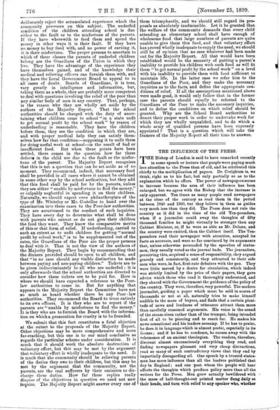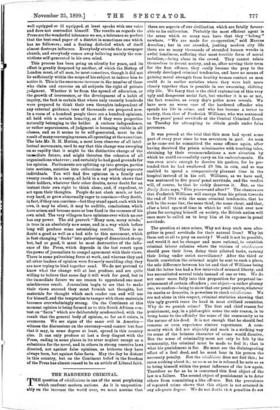THE INFLUENCE OF THE PRESS. T HE Bishop of London is
said to have remarked recently in some speech or lecture that people were paying much less attention to the Press than of old, and he attributed this chiefly to the multiplication of papers. Dr. Creighton is, we think, right as to his fact, but only partially so as to the explanation which he offers. The power of newspapers'seems to increase because the area of their influence has been enlarged, but we agree with the Bishop that the increase is only apparent. Ten times as many people read newspapers at the close of the century as read them in the period between 1840 and 1860, but they believe in them as guides very much less than they did. The Press does not rule the country as it did in the time of the old Ten-pounders, when if a journalist could sway the thoughts of fifty thousand families he might virtually be stronger than any Cabinet Minister, or, if he were as able as Mr. Delane, and the country were excited, than the Cabinet itself. The Ten- pounders read their newspaper with attention, accepted its facts as accurate, and were so far convinced by its arguments that, unless otherwise persuaded by the speeches of states- men, they usually voted as the journal bade. The journalists, perceiving this, acquired a sense of responsibility, they argued gravely and consistently, and they attracted to their side men who were, in fact, first-rate debaters with the pen. They were little moved by a desire for circulation, which indeed was strictly limited by the price of their papers, they gave advice which those who read it thoroughly understood, and they shared with the Government the guidance of the policy of the country. They were, therefore, very powerful. The modern journalist, guiding a paper which must be sold in scores of thousands or not at all, naturally tries to make himself audible to the mass of buyers, and finds that a certain pleni- tude of news and loudness of utterance attract them more than carefully reasoned arguments. His voice is the sound of the steam-siren rather than of the trumpet, being intended first of all to be piercing and to reach far. He makes his news sensational and his leaders screamy. If he has to praise, he does it in language which is almost poetic, especially in its license ; and if he has to condemn, he curses away with the vehemence of an ancient theologian. The readers, therefore, discount almost unconsciously everything they read, and finding newspapers pleasant and very cheap distractions, read so many of such contradictory views that they end by impartially disregarding all. One speech by a trusted states- man has more influence than all the leaders published that day in England ; and one poet whom the people will hear affects the thoughts which produce policy more than all the writers for the Press. Men grow actually bewildered with the mass of half-thought-out printed matter flung daily at their heads, and turn with relief to any speaker who, whether
well equipped or ill equipped, at least speaks with one voice and does not contradict himself. The results as regards the Press are the wonderful tolerance we see, a tolerance so perfect that the best-read paper of a district is sometimes one which has no followers ; and a floating disbelief which of itself almost destroys influence. Everybody attends the newspaper church, and everybody comes away believing mainly the con- victions self-generated in his own mind.
This process has been going on silently for years, and its effect is greatly deepened by another, of which the Bishop of London must, of all men, be most conscious, though it did not lie sufficiently within the scope of his subject to induce him to notice it. This is the enormous increase in the number of those who claim and exercise on all subjects the right of private judgment. Whether it be from the spread of education, or the growth of irreverence, or the development of a habit of inquiry, the fact is certain that where only recently hundreds were prepared to think their own thoughts independent of any external guidance, tens of thousands are prepared now. In a room of a hundred people there are a hundred opinions, all held with a certain tenacity, as if they were properties naturally belonging to the holder. A curious independence, or rather separateness, of judgment is becoming visible in all classes, and as it seems to be self-generated, must be the result of many converging causes, all operating at the same time. The late Mr. R. H. Hutton, a most keen observer of all intel- lectual movements, used to say that this change was sweeping on so rapidly that it might be the distinctive change of the immediate future, and might threaten the cohesion of all organisations whatever ; and certainly he had good grounds for his opinion. Parliaments are splitting up into groups, parties into sections, societies into collections of perfectly separate individuals. You will find five opinions in a family and twenty creeds in a vestry, all held in a way which shows that their holders, whatever their other doubts, never doubt for an instant their own right to think alone, and, if expedient, to act upon their thoughts. People do not clash much, or hate very hard, or grow abnormally eager to convince—they doubt, in fact, if they can convince—but they stand apart, each with his own, it may be silent, it may be audible, conclusions, which have arisen and become more or less fixed in the recesses of his own mind. The very villagers have opinions over which no one has any power. The old proverb "Many men, many minds," is true in an absolutely new sense, and in a way which before long will produce some astonishing results. There is no doubt a good as well as a bad side to this movement, which is fast changing "flocks" into gatherings of dissociated sheep; but, bad or good, it must be most destructive of the influ- ence of the Press, which depends in the last resort upon the power of journalists to compel agreement with their views. There is some pulverising force at work, and whereas they and all other leaders of opinion were formerly moulding clay, they are now trying to bind together sand. We do not pretend to know what the change will at last produce, and are quite willing to believe that some day it will work for good, but in the immediate future we see reason to apprehend one most mischievous result. Journalists begin to see that to make their views succeed they must furnish not thoughts, but materials for thought which each reader can and will use for himself, and the temptation to tamper with those materials becomes overwhelmingly strong. On the Continent at this moment opinion is being formed as to this South African con- test on "facts" which are deliberately misdescribed, with the result that the general body of opinion, so far as it exists, is erroneous. We see signs of the same evil in America— witness the discussions on the currency—and cannot but fear that it may, in some degree at least, spread in this country also. It can only produce at last a deep disgust with the Press, ending in some places in its utter neglect except as a substitute for the novel, and in others in strong coercive laws directed, not against false opinions, as hitherto they have always been, but against false facts. May the day be distant in this country, but on the Continent belief in the freedom of the Press has almost ceased to he an article of Liberal faith.











































 Previous page
Previous page